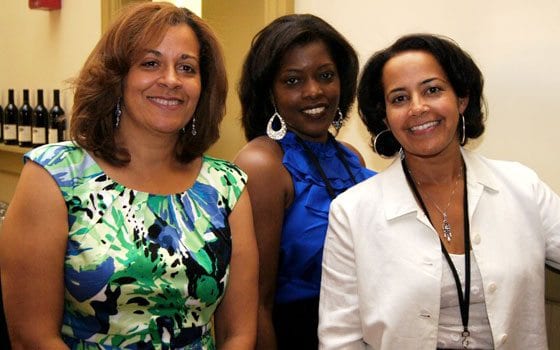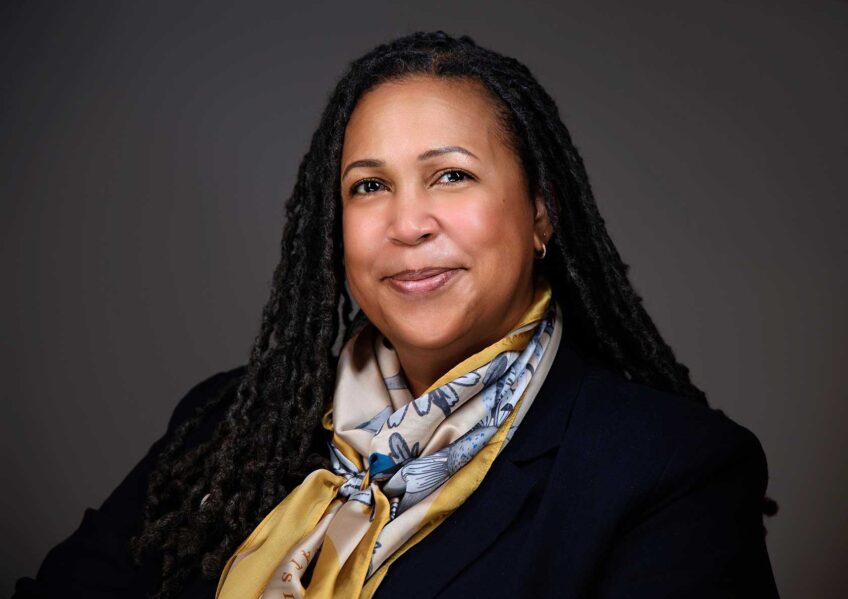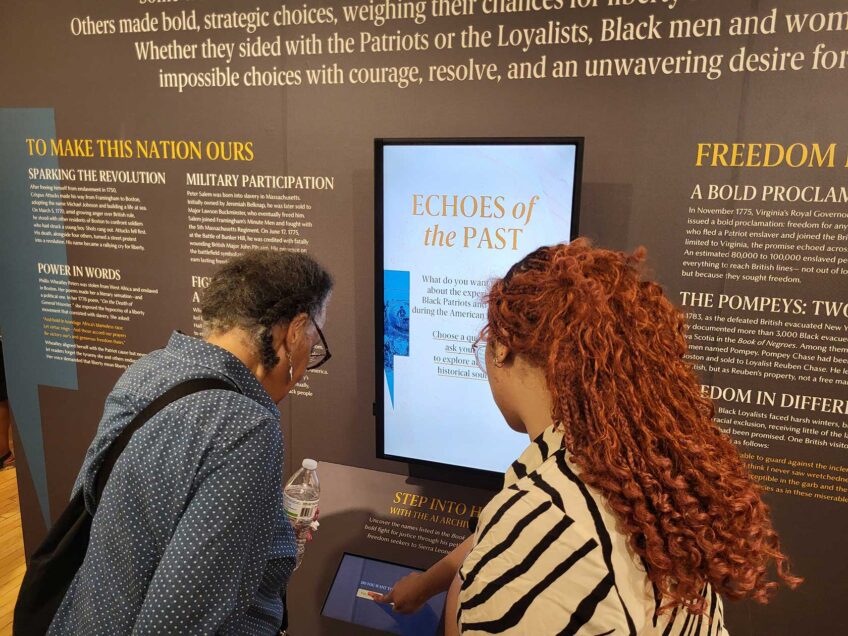

Author: Shelly RunyonJeanne Pinedo, Terri Brown and Lisa Simmons welcomed guests to the RIFF during the opening ceremony at Hibernian Hall last Thursday. This year was the 12th annual festival and it took place from July 29 – Aug. 1.
Film producers from all over the world intermingled with the Boston community to celebrate talent and learn from each other during last weekend’s 12th annual Roxbury International Film Festival (RIFF).
The event opened last Thursday night with a packed crowd teeming with excitement. On stage The Rajdulari Jazz Project serenaded the community as they picked at a buffet of appetizers and mixed drinks before attending the opening night show, “Speed-Dating.”
At the event, Mekita Faiye, producer and star of “Speed-Dating” personally invited everyone to attend the showing of the film at the Museum of Fine Arts. She said she was honored to open the festival and explained, “I really appreciate them giving us a vehicle to tell our stories. Because if [the RIF] wasn’t here, we wouldn’t be here.”
The community vibe was strong throughout the weekend. With more than 50 films to screen, viewers were challenged and impressed by filmmakers, many of whom spoke before and after their respective screenings.
As they shared the process of producing their film and why subject matter was important to them, it was hard not to feel a deep connection between the maker and the movie. Many stories began with a family rumor or memory and blossomed into a journey of self-discovery through the camera’s lens. The effect was obvious — after each screening groups of audience members huddled around producers discussing the high points of their film.
Two such filmmakers screened their very personal journeys this weekend, garnering praise from both audience members and critics.
Guenny Pires shared his three-year investigation into his family’s past which led him to São Tome and Cape Verde in search of his uncle in “Contract.” His uncle, Valdemiro Andrade of Cape Verde, accepted a three-year contract assignment in São Tome in 1964, which turned into a lifetime of punishing work in the cocoa fields. With a pay-rate at $33 per month Andrade was too poor to return home even after more than 45 years of work.
The movie began with a question from Pires’ mother — what happened to her brother? The film ended by exposing devastating human rights violations which continue today in São Tome and Principe.
“I am very emotional tonight,” Pires said after the screening to a sold-out audience. In Portuguese and English he shared how he came to make this film “to promote my cause and my people.”
He explained that “the situation is very hard, very sad,” in São Tome and asked the audience to support him as well as to send money to São Tome, Principe and Cape Verde to help those facing extreme poverty and enslavement. The audience responded by purchasing his previous films on DVD and exchanging hugs and stories with Pires after the screening.
“Contract” was awarded the 2010 Henry Hampton Award for Best Documentary Filmmaking at Sunday morning’s award ceremony.
In another touching screening, Chico Colvard of Boston shared “A Family Affair,” a story of his family’s history which he admits, “came from a place of fear.” Colvard’s family was blown apart when he accidentally shot his sister Paula with a rifle.
As she lay in the hospital injured, Paula, uncertain if she would live, decided that she must expose her father’s abusive acts. Colvard’s mother reacted immediately by calling the police, and in 1978, their father went to jail in Kentucky for less than a year. Though he abused his three daughters, they all have a relationship with him today, but not their mother. Colvard began shooting the film one Thanksgiving with the question — how can his sisters have a relationship with their abuser?
He explained that the film was his way to understand his family dynamic and eventually gain the courage to ask his father, why he did what he did. “People say to me typically … that I have a lot of courage or I am brave for making this film,” said Colvard. But he said that is not the case.
“Real courage,” Colvard explained, is the support he received from Lisa Simmons, president and founder of the Color of Film Collaborative, Inc. and the RIFF.
“A Family Affair” was picked up by the Oprah Winfrey Network after its premiere at the Sundance Film Festival this year and will air to national audiences on the Discovery Health Channel.
After each film, the audience was invited to vote on a film that they felt deserved the honor of the Audience Choice Award — one of eight awards given out this year. The winner was the narrative feature, “Money Matters.”
The film is about a 14-year-old biracial girl, Monique Matters, aka Money, who lives in Southeast Washington, D.C. Faced with illness, her mother reveals her painful past and in doing so, Money discovers that her father is a white priest. Through the movie she struggles to find her place between her gang-ridden neighborhood, her Catholic school, a black mother who is dying of AIDS and the white father she never knew.
Despite the typically heavy nature of many of festival films, the RIFF offered many ways to keep movie-goers upbeat. Community members were invited to attend workshops and panels on navigating the business end of making a movie. Also, between many of the screenings, the festival offered performances from local musicians. Jazz performances, traditional Cape Verdean music, positive hip hop and an afternoon of youth music and dancing kept the audience engaged and the mood lighthearted.






